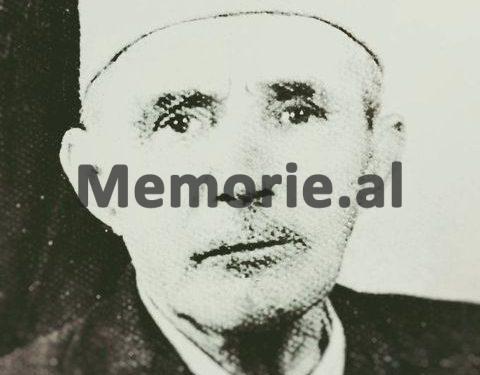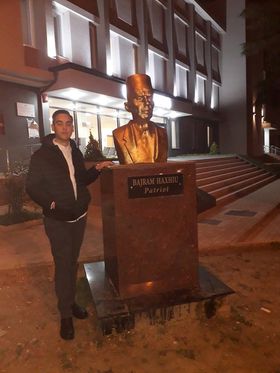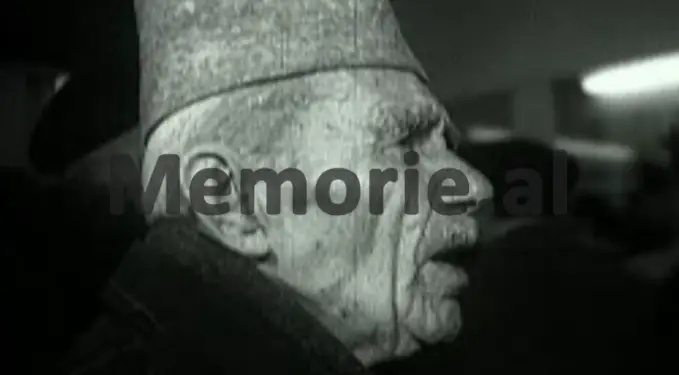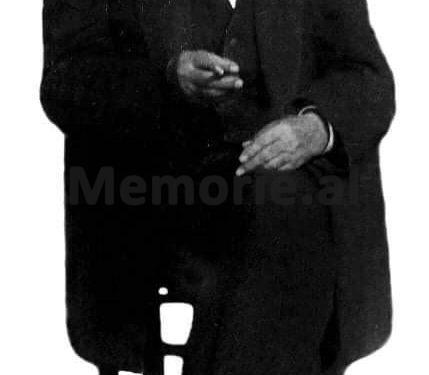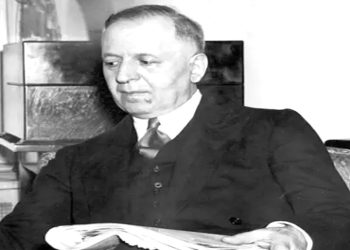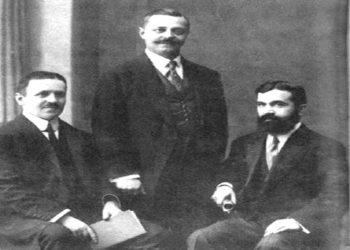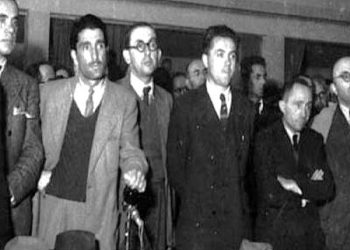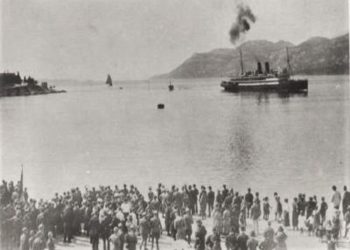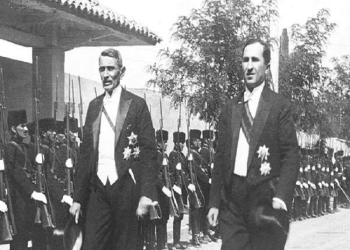Bajram Ragip Haxhiu known by the people of Lushnja as “Uncle Bami” was born on May 3, 1877 in Lushnja. The Haxhiu family is a civic, noble, patriotic family of the city of Lushnja. Bajrami was a patriot, nationalist, democrat, anti-communist, member of the initiative commission Bajram bej Haxhiu completed his high school education in Turkish, while Bajrami continued his higher education in finance at the College in Istanbul. Haxhiu taught him to read and write in Albanian on his own. Bajrami in Istanbul will Bajram Haxhiu was influenced by the patriotic ideas of the Rilindas and dedicated his entire life and activity to the Albanian homeland and national cause. At the beginning of the twentieth century Bajram Haxhiu is one of the main leaders of the movements anti-Ottoman in Lushnja and was a very active participant in the demonstration of May 1906 in the city of Lushnja. He will be arrested for participating in this movement hey and was punished by the Ottoman government. Bajrami after being released from prison did not stop but again continued to participate in the anti-Ottoman movement. On January 17, 1909 in Lushnje one of the organizers of the anti-Ottoman demonstration was Bajram Haxhiu. for the organization of the general uprising of Albania for Independence. After the proclamation of the Independence of Albania on November 28, 1912 he supported the government of Ismail Qemali fighting its Serbian opponents and the quislings of Esat Pasha Toptani. Bajram Haxhiu did not agree with the occupation of Albania from the warring armies of the First World War.Bajram Haxhiu after the First World War continued his patriotic activity against the anti-Albanian decisions of the Paris Conference for the partition of Albania in favor of neighboring countries.Bajram Haxhiu was a Member of the Initiative Commission of the Congress of Lushnja. Bajram Haxhiu was appointed by the Initiating Commission m Haxhiu contributed greatly to the correspondence between Aqif Pasha of Elbasan and other personalities. He served the government issued by the congress and supported it throughout its stay. loyal to the decisions of the Lushnja Congress.
Lushnja National Congress in memory of the initiator, patriot Bajram Haxhiu:
– “At the time when the preparations for the Lushnja Congress were being made, I was a member of the initiating commission for the meeting of this Congress, but 50 years have passed and I remember a few things. There was a wide patriotic movement here in Lushnja. Before gathering Congress, we removed an Italian flag and tore it. There was a large crowd of people and the Italians did not dare to touch us with everyone shouting but in vain. I remember that the man who cared most about the convening of the Congress was Eshref Frasheri. I knew him even before he had been here as an engineer. I remember that after we decided to convene the Congress, we had to designate the house where the meeting would take place. For this we addressed Kaso Fuga but he was worried that he would not get into trouble and did not want to. Then we decided to convene the Congress without and in the hut, we will do it. Aqif Pasha had requested that the Congress be held in Elbasan, but the obstacle was Shefqet bej Vërlaci; this was in time with the Italians. I was in charge of the distributed task. post office in Elbasan, Peqin, Kavaja and Durres, while Taulla Sinani had Tirana and the side of Dibra and Shkodra. I do not remember who else went to the provinces from the south. I just remember that we parted in such a way to go where we knew and to do our job better. In Elbasan I kept in touch with Salim Junik, in Peqin with Adem Gjinishi, in Kavaja with Idriz Dizdara and in Durrës with Rexhep Shala. Everywhere I made this road with horses removing himself as if I were a friend and not a horse. The road was full of dangers, but we were young at the time and we overcame them. Then we did not want to know too much that we were doing a patriotic work. The day Congress started was Wednesday and it was a little cold. At the time when the Congress was taking place, people had come from different parts of Albania. But there were many people from Lushnja in the Congress. I cannot remember them all but I remember that some had come representatives from the villages. During the Congress, it was felt that Lushnja was in celebration. Everywhere you look, national flags, even small flags, were hung on the chests of people by school children. There were also small flags in the hall, where we were hung on the benches of the meeting room was also well decorated. The first was the face of Skanderbeg and then Ismail Qemali. There was a national flag on the wall. There was order in the Congress. They would not accept it if you did not have a note with you. We had received measures to secure the Congress. Armed men had come. Some of them had brought their own delegates to guard them along the way, but there were also those whom we called. More forces had come from Darsia and Dumreja. In it at the same time there were many from the area of the field but I did not deal with the forces. Lazar Bozua was appointed responsible for this work. I remember that Jonuz Dervishi, Selim and Rami Rredhi from Karavastaja, Musa Zagaria from the village of Koçaj in Fier were here -Shegani and others. Riza Cerova had come from Skrapar and another boy who was crippled. Both were brave boys. All the hills around Lushnja were full of guards. Some of the guards also came to the city. The Italians saw them but did not I remember when it was learned that Myfit Libohova had come with an army against the Congress. We could not keep the people because they were ready to be released and captured alive. Some left but did not manage to approach Lushnja instead. fled to Vlora. The government that was elected by the Congress stayed here for 4-5 days, then we accompanied it with songs as we received the delegates. There were many forces from Lushnja, but the most important were the forces organized in Peqin by Adem Gjinishi ”, – Published in the book“ Memories and folk songs for the liberation war of 1918-1920 ”, State University of Tirana, Institute of History and Linguistics, Institute of Folklore, Tirana 1970.
Bajram Haxhiu also supported the War of Vlora in 1920 for the liberation of Vlora from the invading Italian armies. Bajram Haxhiu in April 1922 was a Member of the Commission of the First Local Elections in Albania for the Municipality of Lushnja. In the ’30s and until the early years ’40 Bajram Haxhiu worked as a tax collector in the Finance Office in Lushnja. Bajram Haxhiu was a devout Muslim believer and in the 1930s was one of the financial contributors to the construction of the new Lushnja Mosque. The occupation of Albania by Italian fascists in April of 1939 the nationalist Bajram Haxhiu received him with hatred. In 1945 Bajram Haxhiu opposed the communist dictatorial regime that was established in Albania throughout his life. Bajram bej Haxhiu was one of the great owners of the city of Lushnja and since the Agrarian Reform completely expropriated. On May 25, 1951 Bajram Haxhiu was the second in Lushnja who was named “Kulak”. On May 9, 1967 by decision of the Executive Committee of the Bajram Haxhiu was again expropriated free of charge the only part of the garden left near the existing garage. Bajram Haxhiu passed away on August 11, 1972 in Lushnja at the age of 95, leaving him in oblivion by the communist dictatorial regime and not appreciating his patriotic activity. On the 75th anniversary of the Congress of Lushnja, Bajram Haxhiu (after his death) was decorated by the President of the Republic of Albania SH.TZSali Berisha with Decree No. 1008 Date 18.01. 1995, with the Order “For Patriotic Activities” of the First Class. In honor of the patriot, the street in the neighborhood “Congress of Lushnja”, near the museum house Congress of Lushnja and which continues towards the city center of Lushnja, by decision of the Municipal Council of Lushnja The name “Bajram Haxhiu” was placed. In 2010, the bust of the patriot Bajram Haxhiu was placed in the city of Lushnja. In the year of the 100th anniversary of Tirana, the capital, the family of the patriot Bajram Haxhiu was honored on February 4, 2020, by the Mayor of Tirana Mr. Erion Veliaj with a Certificate of Appreciation with the motivation “For the precious activity and valuable contribution in declaring Tirana the Capital of Albania. Bajram Haxhiu is the father of the Albanian football legend Abdurrahman Roza Haxhiu and homeland prominent for the Albanian national cause in the Albanian Diaspora of Egypt Qerim Haxhiu./Memorie.al




